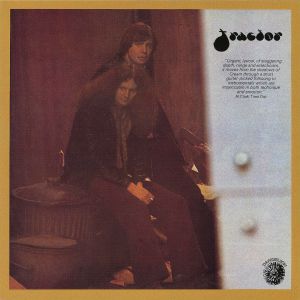
- Format: MP3

Size: 122 MB
Bitrate: 256
mp3
Ripped by: ChrisGoesRock
Japan 24-Bit Remaster
Tractor is a band founded in Rochdale, Lancashire, England by guitarist/vocalist Jim Milne and drummer Steve Clayton in 1971. Both had been members of a beat group, The Way We Live since 1966. They are notable both for their appreciation by John Peel and Julian Cope, but also for their longevity because as of 2007, they are still performing. The third member of the recording band until 1972 was manager and sound engineer John Brierley, who was replaced in late 1972 by Alan Burgess as recording engineer and Chris Hewitt as manager and live sound engineer.
In the early days, the main marketing tool of unsigned hopeful bands was to send demo tapes to sympathetic DJs. Accordingly a tape was sent to Peel who had a fondness for Rochdale, having worked in a cotton mill there before becoming a DJ. Peel sent his label manager, Clive Selwood, from London to Rochdale in order to sign up the band.
The group was booked into London's Spot Studios and finished the sessions within two days, and in January 1971 the band's debut album, A Candle for Judith was released, credited to The Way We Live. The release, named after Clayton's then girlfriend, later wife, earned immediate critical acclaim "...impeccable in both technique and emotion"... Al Clark writing in Time Out in London in 1971.
Meanwhile Peel, who had previous links with Rochdale, bought the band recording equipment and a stereo PA system. He also convinced the band to change their name. Looking out of his kitchen window at Peel Acres in Suffolk, he spied a tractor in the fields adjacent to his house and recommended it as a name to them. Tractor's first release after the name change from The Way We Live was a 7 inch maxi single -- "Stoney Glory"/"Marie"/"As You Say" -- for Dandelion. They also backed up another Dandelion act called Beau -- led by C.J.T. "Beau" Midgley -- on the album Creation. All of this recording was done in an attic and bedroom studio of a terraced house in Edenfield Road Rochdale, which John Peel named Dandelion Studios,Rochdale to tie in with his record label Dandelion Records.
The duo's first full-length follow-up was released in 1972. By January 1973, the album was earning positive reviews. Melody Maker stated "albums don't come any better than this", Bob Harris, Anne Nightingale on BBC Radio One and Kid Jensen on Radio Luxembourg all gave heavy airplay to the album and it climbed to 18 in the Radio Luxembourg album charts and to 30 in the Virgin Bestseller charts. Longtime sound engineer John Brierley was eventually replaced by former The Way We Live singer Alan Burgess and, along with Milne, Clayton, and new production manager Chris Hewitt, the group began building a studio in a 3rd Floor / attic in Dawson Street, Market Street Heywood, Lancashire, named Tractor Sound Studios, again partially financed by John Peel. This studio would feature in a BBC film about Rochdale, Heywood, and John Peel, when the band and Chris Hewitt revisited the studio in December 2006. The third album for Dandelion, which was to be eventually released in the 1990s as Worst Enemies, was recorded at both Chipping Norton Studios, Oxfordshire and Tractor Sound Studios, Heywood. Standout track is the 21-minute piece about the Peterloo Massacre.
Tractor eventually left the Dandelion label which had effectively ceased to operate by late 1973.
Tractor then recorded a single in their Heywood studio, the reggae-tinged "Roll the Dice", released on Jonathan King's UK Records label.
In the summer of 1976, Milne and Clayton and manager Chris Hewitt who had returned from London where he had been working for a London PA company mixing sound for Ian Dury,Carol Grimes, and Sheer Elegance on live gigs, recruited bassist Dave Addison and teamed up again with studio engineer John Brierley, now the owner of Cargo Recording Studios at that point based in his house on Drake Street. They recorded another single -- "No More Rock 'n' Roll"/"Northern City" -- which was issued on Cargo Records of Rochdale and made the newly invented NME Indie singles chart. It was released to coincide with the 1977 Deeply Vale Festival, a legendary North West England music festival of the 1970s which the band were heavily involved in. At this point Tractor Music- PA Company and Music shop moved into premises along with Cargo Studios on Kenion Street Rochdale. The whole street became a music complex during the 1970s to the 1990s with many well known bands including Joy Division buying equipment here and hiring PA's from Tractor Music and recording in Cargo Studios, renamed Suite Sixteen Studios (owned initially by Peter Hook of Joy Division and Chris Hewitt) from 1985
In 1980, Tractor Milne, Clayton, and Addison went in the studio once again, this time adding blind musician Tony Crabtree on keyboards/guitar. They recorded another single -- "Average Man's Hero"/"Big Big Boy" -- this one for Roach Records, which was a label run by the band themselves.
01. All Ends Up
02. Little Girl In Yellow
03. Watcher
04. Ravenscroft's 13 Bar Boogie
05. Shubunkin'
06. Hope In Flavour
07. Everytime It Happens
08. Make The Journey
Bonus tracks:
09. Siderial
10. No More Lies
11. Mr. Evolution Man
12. Every Time It Happens
13. Storm
14. Watcher